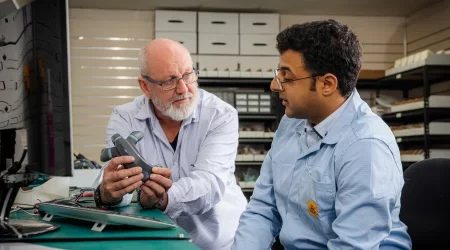This article first appeared in Idealog.
A New Zealand neuro technology company is helping chronic pain patients on their rehabilitation journey through simple games.
Operating out of the North Shore suburb of Albany in Auckland, Exsurgo manufactures the Axon system – a piece of technology used to help those living with chronic pain.
With one in five New Zealanders affected by chronic pain, this system is a mobile version of an electroencephalogram (EEG) – a machine that measure electrical activity in the brain.
Exsurgo’s ‘Axon’ system uses EEG neurofeedback to train chronic pain sufferers to manage their pain, avoiding or reducing the use of pharmaceutical drugs which come with the risk of addiction or side effects.
Faisal Almesfer, Co-Founder and Chief Technology Officer, says the technology “will basically retrain your brain, the pain pathways and it will change how your brain perceives pain”.
“There is strong scientific evidence that people suffering from chronic pain have different electrical activity in the brain than the normal healthy brain,” he says.
In New Zealand, chronic pain costs the country over $13-14 billion USD a year.
Almesfer and Exsurgo Co-Founder Richard Little were already working in the space of rehabilitation, initially inventing an exoskeleton for people who had spinal issues, allowing them to stand and move.
Working in the industry, Almesfer and Little realised that rehabilitating wasn’t just about the physical aspect but also the “neuro world”, which prompted them to look further into neuroscience and technology.
After a lot of trial and error and over 40 prototypes, Almesfer, Little and Exsurgo were able to create Axon, a mini version of an EEG machine that is set to help those dealing with chronic pain.
“What we’re trying to do is reduce that amplifier box of an EEG machine into a small circuit box and make it wireless,” says Almesfer.
Almesfer says that creating Axon was the only way to “push neuro feedback” into people’s homes through the creation of a wearable device and mobile app.
“That is a big jump in technology that required us to do that,” he adds. “We are definitely pioneers in that.”
After nailing down the technology, Almesfer says that gamifying the technology was the next step.
Originally, the product showed live feedback bars of their neuro activity, but Almesfer says that was boring for a patient.
“Gamification is the best option for the product,” he says.
When a patient wears an Axon product, they will then be able to play games that exercise their brain.
Almesfer says its recommended that patients dealing with chronic pain exercise their brain through Axon for 30 minutes daily over eight weeks.
“We believe that [Axon] is enough to create a drastic change within the brain so that they can perceive less pain and respond to pain differently,” he says.
The system is undergoing multiple clinical trials at the moment, and so far, Almesfer is seeing positive results.
“We’ve seen people say that they got changes in the amount of medication they are taking, even then types of medication and the dosage they use. We hear a lot of people have reduced anxiety, reduced stress, reduced depression symptoms, an increase in the quality of their sleep. All these factors now impact the reduction of their pain and improves their quality of life.”
By early 2023, it is hoped that patients will be prescribed the Exsurgo headset by a doctor and, under a subscription model, pay an annual fee to use the system.
Almesfer says that Exsurgo already has an idea of how many Axon products they will be able to sell and adds that the company is also now working on scaling up to cater to the “huge amount of sales next year”.
Along with working on clinical trials, Almesfer says Exsurgo is working on other applications for chronic pain as technology evolves.
“In the pipeline we’re already looking at using this for the reduction of anxiety. It can be used for reduction of depression, ADHD and insomnia.”
“Once we get into chronic pain and really make our mark in the world, there is definitely more ailments we can treat.”
Despite not being readily available for patients just yet, Exsurgo is continuing to work on the next generation of this technology that does not require wet sensors.
In the meantime, Exsurgo is undergoing its largest clinical trial for the product involving 116 patients from the Waitematā District Health Board, to ensure the efficacy and safety of the product.
